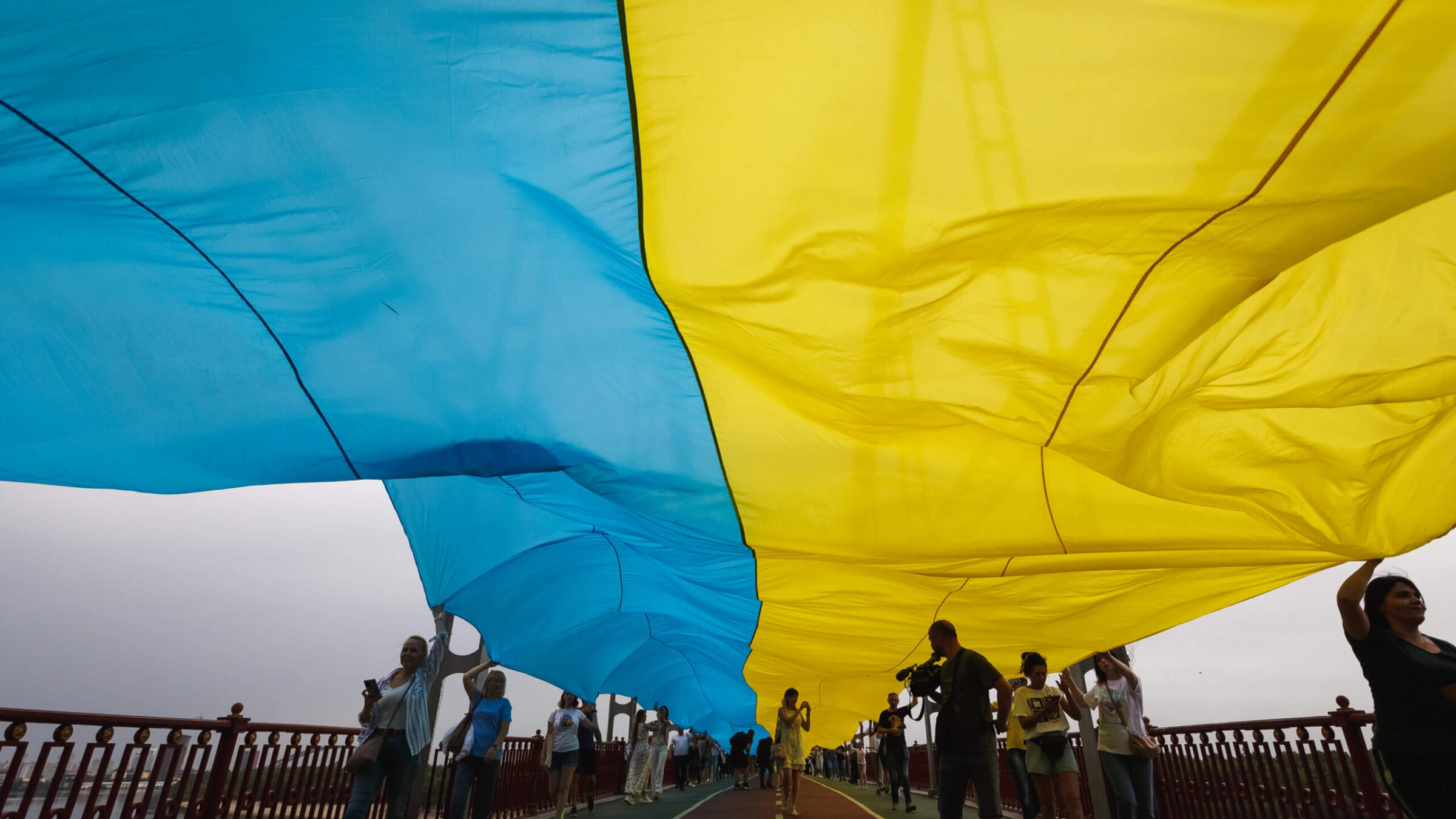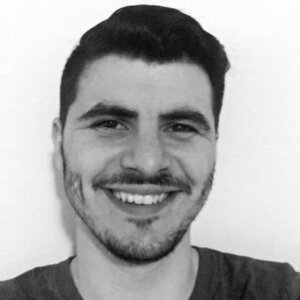I worried antisemitism would engulf Ukraine after Russia invaded. I was wrong
Russia’s invasion has unified all Ukrainians, including its ethnic minorities, in the battle for its existence

People hold a 430-meter-long Ukrainian flag along the park pedestrian bridge over the Dnipro River during the “Ukraine is united” political performance on August 28, 2022 in Kyiv, Ukraine. The symbolic unification of the left and right banks of the Dnipro demonstrates the unity of the Ukrainian people in the struggle for Ukraine’s independence. Photo by Yurii Stefanyak/Global Images Ukraine via Getty Images
Antisemitism in the former Soviet Union was many things, but never subtle. As my mother succinctly described it: “When they realized you were a Jew, their nose and lip would turn as if they just smelled s***.”
The current dictator of my native Belarus, an ethnic Ukrainian named Alexander Lukashenko, echoed this brusque bigotry when talking about my hometown of Bobruisk, Belarus — a place once well known for its sizable Jewish community. “You know how Jews treat the place they live in,” Lukashenko said, alleging that Jews “don’t care for” their homes and allow them to fall into disrepair.
In-your-face and often violent antisemitism was an experience widely shared by 2 million Soviet Jews, driving many, including my father, to be active otkazniki (refuseniks) and ultimately for over 1.5 million of us to flee to Israel, America and elsewhere outside of the Soviet Union. Yet there were Jews who remained after the collapse of the Soviet Union, including over 250,000 Jews in Ukraine. When the Russians invaded Ukraine for the second time in 2022, I feared for Ukrainians I knew, but I also feared how Ukraine at large would respond, especially with a Jewish president at the helm during this national catastrophe.
Would Ukrainians blame their Jewish leader and Jews at large for their woes? Would Ukraine be consumed by its worst history? In the face of a genocidal invasion, Ukraine has, so far, been charting a different course: fighting for a free Ukraine that includes its ethnic minorities like Jews.
You could be forgiven for being confused about this fear. It’s a war, who has time to persecute the Jews? The unfortunate answer is that in this part of the world, plenty of armies and nations have made time for murdering Jews during conflict. In the wars that followed World War I in Eastern Europe, over 100,000 Jews were murdered in 1919 alone by various Slavic armies and their supporters. The Nazis are the most infamous for this, prioritizing murdering Jews while they continued to wage war against the Soviet Union. After the war was over, Stalin’s regime began to implement antisemitic policies ranging from downplaying the genocide against Jews specifically to a campaign against rootless cosmopolitans.
Many in the FSU before and after the “Great Patriotic War” (WWII) believed Jews were cowardly, that they were not loyal to their nation and that they were poor fighters. Those ideas were widespread in the Soviet era. One wonders how much antisemitic tropes promoted in Soviet times informed modern Russia’s invasion plans when they thought about Ukraine’s Jewish President Volodymyr Zelenskyy.
Zelenskyy, like his own grandfather who fought in the Red Army in World War II, has proven to be no coward. As Russia’s invasion to destroy Ukraine began, Zelenskyy was urged by Western leaders to evacuate. In the quip heard round the world, Zelenskyy famously replied “I need ammunition, not a ride.”
As Russia’s army marched on Kyiv and Russian assassins from the Wagner paramilitary group (a group named after a hero of the Nazis) came for Zelenskyy personally, Russian misinformation campaigns began to claim Zelenskyy had fled and ordered Ukraine’s army to lay down arms. Zelenskyy, at great personal risk, combated the misinformation by coming out into the open air in Kyiv and recording videos reminding Ukrainians what they were fighting for. “Our truth is that this is our land. Our country. Our children. We will defend all of it.”
As Zelenskyy released his videos telling his people he would stay and fight, so did the Ukrainian people. In one video shortly after Zelenskyy’s announcement that he wouldn’t leave Kyiv, Ukrainian soldiers, urging Russian forces to leave or surrender, spoke in Russian saying “You thought our president was a comedian and clown. Turns out he is an iron joker who f**** you with bayraktars (a type of combat drone).” The region continues to not be known for its subtlety.
The inclusive heroism on display was not just Zelenskyy’s, but Ukraine’s as a whole. In a time of war it would be easy to become xenophobic. To become blood and soil nationalists as so many Central and Eastern European societies like Romania fighting the Soviet Union and Hungary after the collapse of Austria-Hungary have done in times of acute distress. To say there is one kind of Ukrainian, and it is not an Armenian, a Greek, a Jew or a Muslim Tatar.
Yet Ukrainians by and large have not disintegrated along ethnic lines, but have unified as a nation. Ethnic minorities within Ukraine have rallied as much as ethnic Ukrainians in the goal of defending Ukraine from the existentialist threat it faces from Russia. As one Muslim Ukrainian soldier sharing a foxhole with a Jewish soldier remarked, “consider how much the Russians pissed us off that Muslims and Jews fight together.”
It would have been very understandable if Jews inside and especially outside of Ukraine, given their painful history with both Ukrainians and Russians, sat on the sidelines and said a pox on both their houses. It didn’t happen. Former Soviet Jews in New York raised millions for Ukraine. Jews with ties to Ukraine took up arms for Ukraine. Every kind of Jew with roots in Ukraine from observant Ukrainian Jews to secular Israelis who had fled Soviet Ukraine joined the fight. The Ukrainian army, with its chief rabbi, held a Pesach Seder in the middle of a war.
The descendents of Cossacks rallied behind their Jewish leader. Ukrainian Jews and Jews with recent roots in Ukraine joined the fight for a free Ukraine. The previous two sentences would be impossible to explain to any of our ancestors, Jewish or Cossack. That fight, unfortunately, continues a year later.
I do not know when and how Russia’s awful war against Ukraine ends, but I know that this Ukraine is, for now, charting a different course than Ukraine and many Eastern European societies have in the past. Rejecting a narrow ethnic nationalism, Ukraine’s leadership and much of its populace is fighting for the freedom of all Ukrainians, no matter their ethnicity. Glory to this Ukraine. Glory to her heroes.
To contact the author, email [email protected]
A message from our Publisher & CEO Rachel Fishman Feddersen

I hope you appreciated this article. Before you go, I’d like to ask you to please support the Forward’s award-winning, nonprofit journalism so that we can be prepared for whatever news 2025 brings.
At a time when other newsrooms are closing or cutting back, the Forward has removed its paywall and invested additional resources to report on the ground from Israel and around the U.S. on the impact of the war, rising antisemitism and polarized discourse.
Readers like you make it all possible. Support our work by becoming a Forward Member and connect with our journalism and your community.
— Rachel Fishman Feddersen, Publisher and CEO





























